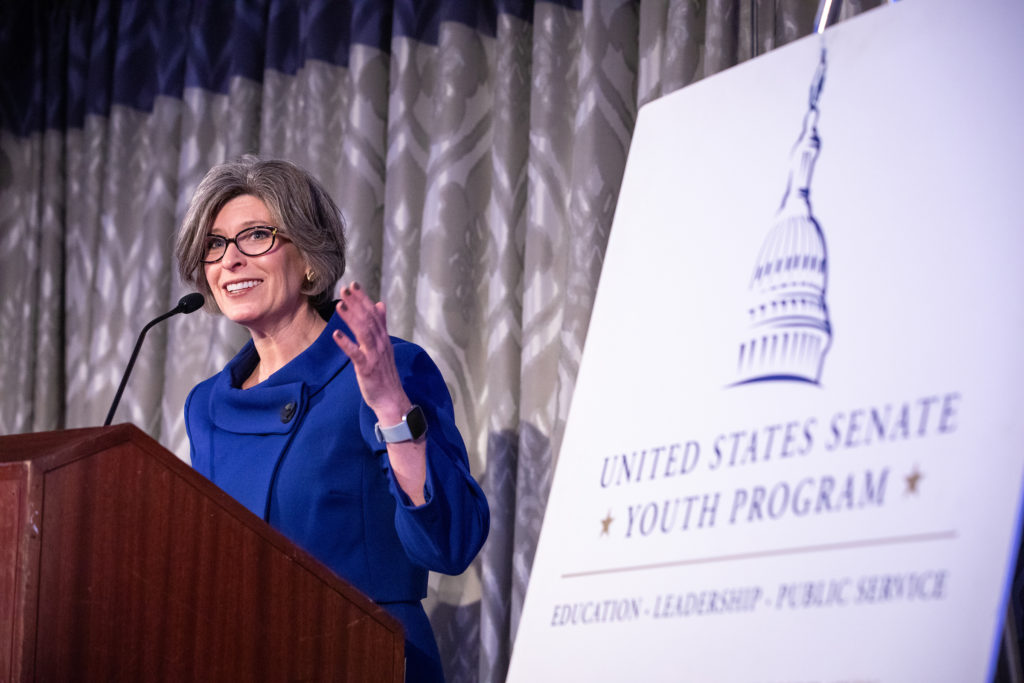
Senator Joni K. Ernst (R-IA) speaking to the 2019 delegates.
The opening dinner of the 57th annual Washington Week began with the historic melodies of the Old Guard Fife and Drum Corps. The USSYP 2019 Republican Co-Chair Senator Joni K. Ernst of Iowa soon took the stage to share her Midwestern warmth, behind-the-scenes Senate stories, and sound advice for success in life. Her rural state and farming background set the foundation for the pillars that guide her life today. “Like families across America, we worked hard for what we had, and we leaned on each other and our neighbors for support,” she reflected.
Joining the Army ROTC while attending Iowa State led to her role as a company commander in Kuwait and Iraq during Operation Iraqi Freedom One. “The years I spent in the military were some of the best in my life, and it was an honor to serve. During that time, I learned how truly exceptional our great nation is,” she said. “Today in the United States Senate, I may wear a slightly different uniform, but my focus and commitment to the American people has never faltered.”
The four principles that she strives toward every day are: Leadership, Prudent Risk, Service and Gratitude. Senator Ernst defined leadership as “Encouraging and empowering those who look to you for direction and guiding them on the best path forward.” She urged the delegates to “take risks but use reason. Know your challenges. Discover new opportunities. Evaluate the good and the bad in every situation and then make a prudent decision.” Her third pillar, Service, resonated with all in attendance, “That sense of responsibility to your community, to our nation, and to one another must be acted upon. Respond to that call of duty to your neighbors and to your nation in plentiful times and also in times of great need.” Addressing Gratitude, she advised the delegates to “be grateful each and every day for the wonderful blessings bestowed on you and especially for those who have helped make those blessings possible.”
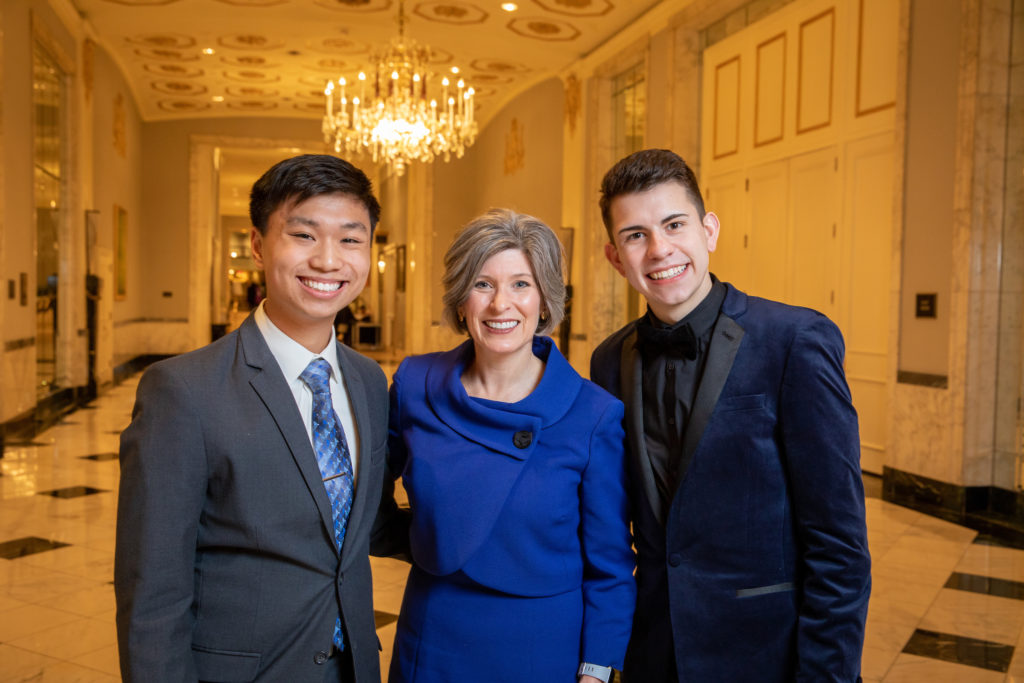
Senator Joni K. Ernst (R-IA) with Iowa delegates James Meng and Kevin Drahos
Delegate Kirsten Kraske of Montana said, “My favorite speaker of the whole program was Senator Joni Ernst. I strive to model my life like hers. She grew up in a small town in Iowa, joined the ROTC, had a small business, and only then did she run for public office. I do not want to be in ROTC, but I think it is super important to get some experience in the private sector before going to the public sector. She has been an awesome senator for the United States and because of all her accomplishments, I strive to be like her.”
In closing, Senator Ernst reiterated a keystone of her guiding tenets, “Illustrate an attitude of gratefulness. We never get to where we want to be without our friends, without our family, without our teachers and without other role models behind us and also showing us the way.”
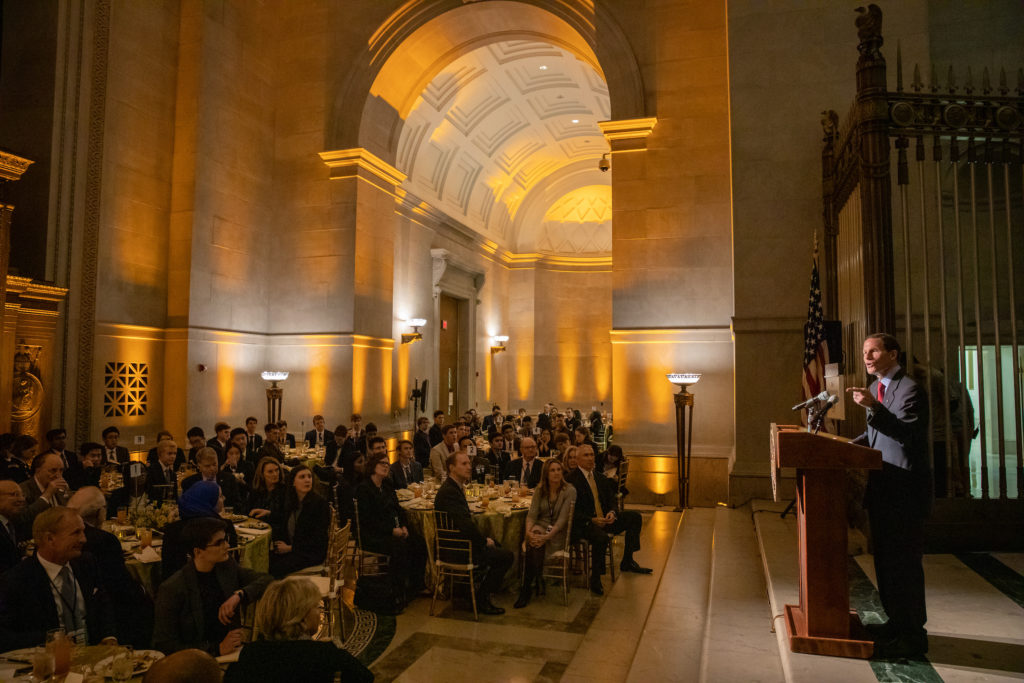
Senator Richard Blumenthal (D-CT) addressing the 2019 delegates at the National Archives
A rarefied experience, even for Washingtonians, is receiving a behind-the-scenes tour at the National Archives and engaging in a personal Q and A session with the Archivist of the United States, David S. Ferriero. Each year, the Archivist does just that for the USSYP delegates, giving them special access to the treasures housed within the building’s magnificent rotunda, including the Magna Carta, the Declaration of Independence, the Bill of Rights and the Constitution. Dining adjacent to the rotunda that evening, the students are surrounded by America’s founding documents, also known as the Charters of Freedom.
As Senator Richard Blumenthal, an expert on law and law enforcement, stepped to the podium, he remarked that it was also a first for him to deliver a keynote just steps from the Constitution. He reflected on his path to public service, from Harvard College and Yale Law School, to joining the Marine Corps Reserve, before becoming a U.S. Attorney where he prosecuted cases on Civil Rights and environmental pollution. “Most of my life has been about enforcing laws, not making them,” said the former chief federal prosecutor, “But at the core of everything I do, is helping individual people, keeping in mind their faces and voices. Reaching out to people and listening.” As a young Supreme Court law clerk, he asked esteemed Justice Byron White for advice on entering public service. “He banged on his desk emphatically and said, ‘Roots!’, Senator Blumenthal recalled. “He told me to go back to my community, or put down roots in one of my choosing, and help people.”
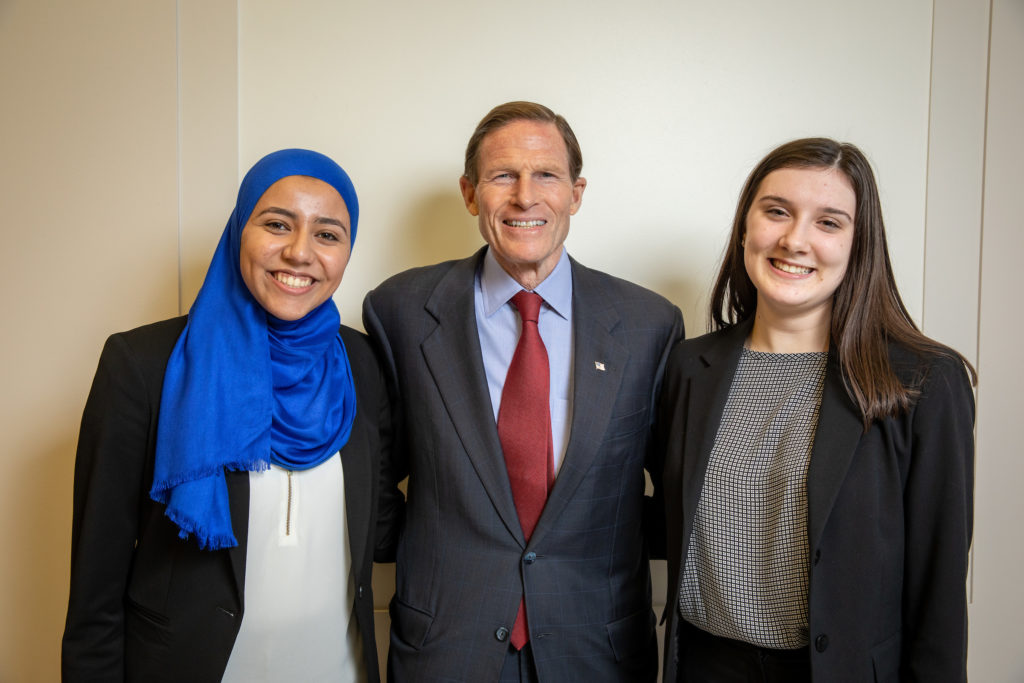
Senator Richard Blumenthal (D-CT) with Connecticut delegates Bayan Galal and Megan Striff-Cave
During a lengthy Q and A, Senator Blumenthal shared innovative ideas he endorses to reduce the student loan burden on young people by allowing loan forgiveness through public service. In response to a question on climate change, he lamented, “I will be very blunt. I am ashamed and embarrassed that my generation hasn’t done more. One of the basic compacts in America is we leave the country and the world better than we found it.” Senator Blumenthal noted that he was the students’ age when President John F. Kennedy declared that America would put a man on the moon by the end of the decade. “At the time, nobody knew how to put a man on the moon! We didn’t have that technology. Today, we do have the technology to save the planet. And there is a real and bipartisan conversation going on about how to do so while creating many jobs. I welcome your involvement and engagement, if you have ideas, because this is one of the preeminent challenges of our time.”
In closing, Senator Blumenthal commended the delegates on serving in the program and encouraged them again, “I know a lot of folks have probably been telling you that you are our future leaders,” he said. “In fact, you are our present leaders. You are the here and now for this country. You are the people who are going to give us the conscience and conviction we need in this challenging time.”
“One of the speeches that resonated with me most was the speech given by Senator Blumenthal of Connecticut at the National Archives. He directly addressed each of the issues that I felt most passionately about. He gave his honest views on education reform, immigration, and politics in Washington, and hearing these things right next to the original Constitution and Declaration of Independence only made the experience even more unreal,” said Missouri delegate Zoie Francisco.
Photos by Erin Lubin and Jakub Mosur
